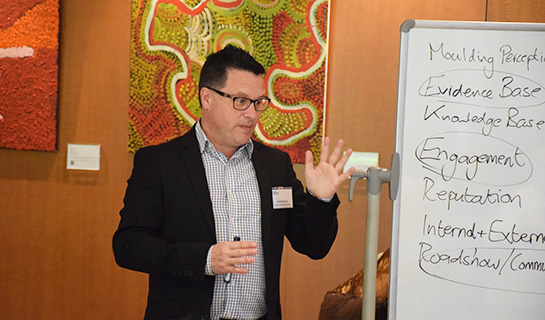Corruption Matters - November 2018 | Issue 52
Is trust still possible for today’s body politic?.
Ethics, integrity and governance are certainly not new concepts but they have been the focus of many in, and around, public administration in recent times. It seems that more than ever before high-ranking public servants around the world are being held to account for their distrustful behaviour. The Victoria Business School’s Michael Macaulay (pictured) spoke at the National Investigations Symposium in Sydney about the how and why of engendering trust in a post-trust society.
Dr Macaulay’s workshop and speaking session at the biennial symposium in November 2018 looked at the psychological tools to help shape and build trust and how these can be used in both positive and negative ways. “It is important to realise that there are people who are brilliant at building trust relationships, but they do so with the express intention of breaking them for their own gain,” he says.
“There are great reasons for not necessarily trusting either people or organisations and the idea that it is an inherent good, which I frequently see or hear, is sometimes misjudged. Trust is truly something that needs to be earned and updated because it is a relational good – a mediating force between people.”
When it comes to the arms of government, an integrity system is essential as a way to serve the public trust. Dr Macaulay explains that an integrity system is the balance of values and regulations, as well as the practices and processes, organisational, cultural and behavioural factors, and so forth, needed to ensure integrity in an organisation, and that the nature and extent of these may differ from agency to agency.
There is no one system that represents the optimal integrity system. “That’s a crucial point,” he explains. “There is no one-size-fits-all approach to this because each organisation is unique. There are, of course, key building blocks at the individual, environmental and systemic levels. But the exact nature and configuration of these will be different in each agency.”
Dr Macaulay is quick to add that even high-integrity organisations need to be aware of their performance to ensure that standards remain at that level. “There isn’t an agency in the world that is not immune to ethical problems because such issues frequently come around through periods of change, to which they are all susceptible.”
We are living in an era of unprecedented access to information (and sharing of that information) through social media platforms, legislation and so forth, with the integrity of information – the fake-news phenomenon – also being called in to question.
“The use of social and digital media has given us very different perspectives on what is a private or a public action. A throwaway joke in conversation can have a very different impact to one on Twitter. Integrity systems need to reflect on this and work out the best approach to working with it. Integrity is a dynamic force and we always need to be moving alongside it,” Dr Macaulay said.
National Investigations SymposiumThe National Investigations Symposium is a joint initiative of the NSW Independent Commission Against Corruption, the NSW Ombudsman and the Institute of Public Administration Australia NSW. |

